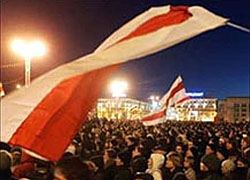World mass media: EU leaders shouldn’t forger that Belarus is dictatorship
6- 8.05.2009, 18:08

Leading mass media criticize participation of the Belarusian dictatorial regime in the Eastern Partnership summit, noting that the European Union should be more adhering to principles concerning human rights violations in our country.
“The Swedish-Polish initiative Eastern Partnership was adopted in order to strengthen advance of the multilateral European Neighbourship policy in the Eastern direction. But is looks rather paradoxical that “mutual interests and commitments” are placed before “values” of the EU summit declarations.
Alyaksandr Lukashenka, who had been ruling Belarus for the last 14 years, was invited to Prague despite of his reputation of the “last dictator of Europe”. It looks as if the EU leaders have forgotten that democracy is absent in this country, that the ruling party controls mass media, that mouths of oppositionists are gagged, and about numerous cases of deprivation of freedom, which even caused imposing sanctions against Belarus. Last year even alleviation of these sanctions was sharply criticized.
The Belarusian election was neither free nor fair, and in the sphere of democracy in Belarus “no positive changes” have been noticed. Making a speech at the European parliament’s conference, the Belarusian representative in the EU frankly said: “The EU should be interested in Belarus being on its side”. Such a pragmatic approach not just casts light upon Minsk’s sceptical approach to the Eastern Partnership, but shows that Belarus is not going to build its policy according to the principles of the EU, and that it would consider Russia “its only real partner” as before,” Turkish newspaper “Today's Zaman” writes.
German “Die Welt” writes that “the six partner countries make more than a heterogeneous group in all respects. Moldova and Belarus are obviously under Moscow’s influence. Their presidents Vladimir Voronin and Alyaksandr Lukashenka do not take part in Prague meeting”.
The influential American “The Wall Street Journal” notes more harshly: “The EU didn’t state clearly how quick 600 mln Euro would be allocated, and what criterions of the reforms’ effectiveness would be, There is a dictatorship in Belarus, and there are considerable problems in the sphere of human rights in some countries. Four out of six countries have unsolved territorial conflicts.”
“The Eastern Partnership was designed as a way to give a hand to the six countries of the former Soviet Union, without offering them a possibility of joining the EU,” notes the French newspaper “Le Monde”. “In reality, the European Union has rushed into a struggle for influence with Moscow, trying to entrench in its neighboring countries its “soft power” as a counterbalance to Moscow’s readiness to use the whole range of offensive means for nailing down the Kremlin’s authority in the zone of its “priority interests”. Russia has called the partnership offered by Europe interference in its natural sphere of influence, and exerted strong pressure on the neighbouring countries with the aim to thwart the process. In response Europeans lowered demands to these regimes, where respect of democratic norms leaves much to be desired: the issue of values has paled into insignificance for the sake of geopolitical interests. Thus, the authoritarian Belarus has been invited to the project under the condition that Lukashenka won’t recognize independence of Abkhazia and South Ossetia,” the French newspaper writes.










